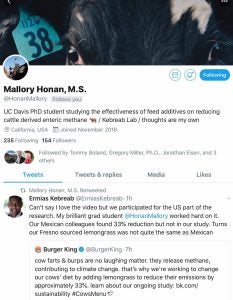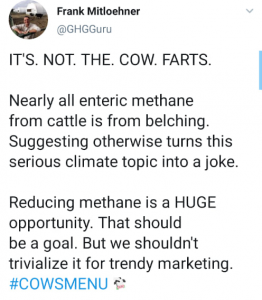Agriculture has been putting Burger King’s new #Cowsmenu ad campaign on blast. And not in a good way.
The premise of it — reducing methane gas — is noble. They claim that methane from cattle can be minimized by adding lemongrass to cattle feed. The research comes from Autonomous University in Mexico and University of California-Davis scientists, screenshot here:

If you follow their research, you find that the results appear inconclusive or somewhat promising but have yet to be finished or published. This is BK’s statement that further explains how the whole “lemongrass in cattle feed” works. There is also evidence of this with other additives like seaweed. (But it’s important to ask, what is the carbon footprint of growing and transporting this much lemongrass or seaweed? From tropical climates? What about the costs associated?)
In my opinion, UC-Davis is one of the best universities out there when it comes to learning and studying methane in cattle. Dr. Alison Van Eenennaam (@biobeef on Twitter) Dr. Frank Mitloehner (@ghgguru) Dr. Sara Place (@drsplace) are all scientists I know personally who do amazing #scicomm work in this space. Please follow them — you’ll learn a ton!
Like, did you know 97 percent of methane emitted from cattle actually comes from their mouths? This is another way Burger King dropped the ball … by focusing so much on farts: It’s not about that!

Anyway, BK could have turned this research into an amazing ad campaign (after the research was replicated, conclusive, and actually published, of course!) but instead they made an awful child-filled propaganda piece that angered scientists and farmers and led to thousands of people vowing to boycott their products from now on. (Evidence of this all over Twitter and responses to their ad with #BoycottBurgerKing)
The backlash toward Burger King was intense from all walks of life. For once, vegan animal rights activists and livestock farmers can come together and agree on something! Vegans feel the ad and the fast-food company’s efforts just aren’t good enough since beef is still on the menu. Livestock farmers, self included, have been upset at how we were portrayed. The average consumer felt insulted like it was virtue signaling and green washing. Scientists were upset that their research was twisted into the video the way it was.
To quote Dr. Van Eenannaam to Dr. Kebreab of UC-Davis:

Thousands of people voiced their displeasure for the ad, and I sent a tweet to Burger King Chief Marketing Officer Fernando Machado (@fer_machado123).
Thankfully, it worked and they listened! I had a Zoom call with Machado last week to express why so many of us were offended and bothered by the ad. “Put yourself in our shoes!” I explained. “We in agriculture constantly feel attacked, whether it’s from food companies or activists … people really have no idea what we do. We oftentimes feel very undervalued and under appreciated, and it would be nice to have brands actually thank us and showcase the work we do. Lift us up, don’t tear us down. Without farmers, Burger King has no beef at all.”
Farmers and ranchers work to improve environmental efficiency every day, and according to the EPA, livestock account for just over 2.5 percent of total U.S. ghg emissions. Methane digesters and feed additive research to reduce methane is nothing new and is part of the reason why farmers today “do more with less” and have reduced livestock emissions by 40 percent or more in some sectors over the years. (Check out Dr. Jude Capper’s research on this at @bovidiva)
The opinions of the scientists involved is overwhelmingly in agreement. Promoting reduction of methane should be applauded, and breakthrough research should be shared, however, the marketing and the commercial was awful, their facts were arguably premature and not accurate, and the farmers and scientists weren’t given a say.
Having the call with Machado was very good. Burger King has since edited the video (which previously had over 4 million views) on their YouTube channel and deleted the “elevator scene” — they seem to realize, in hindsight, that they screwed up. Machado was apologetic, and I think they genuinely felt sad for making us feel that way. He said had no idea they would receive such backlash and said it was not at all their intention.
Here’s a video I did on Facebook that further explains how it all went:
That being said, they said they do want to highlight the work of farmers now and have agreed to come out to my beef farm here in Iowa next month! The creator of the ad, Gustavo Lauria, a co-founder of the We Believers agency, will be here as well, and they’ll be filming and highlighting agriculture and our farm. I genuinely applaud their decision and wish other brands would do this also. Stonyfield Organic and Chipotle were just two of the brands that, rather than engage with farmers and experts, just blocked and silenced farmers and ranchers while refusing to have a dialogue. I am banned from Chipotle’s social media accounts purely because I highlighted the many benefits of GMOs. (Note: Chipotle’s recent attempts to mend fences with those in agriculture are being seen as too little way too late.) #silencedbystonyfield or The Banned Consumer Facebook group are also popular places to look to learn more about all of this.
The fact that BK wants to have a dialogue is so refreshing, in my opinion. They said they want to continue cattle-feed-sustainability research but want to run future marketing campaigns past myself and other experts in agriculture before releasing future footage. Sometimes, people can try to put themselves in our shoes, but it often doesn’t work since there’s such a disconnect between consumers and ranchers/farmers.
If I had my wish, it would be to have them remove the #cowsmenu song all together. But, imagine if they did that and all the backlash they’d get from that too? Sometimes you just can’t win.
Machado said he learned a lot from our call, and I believe Burger King is also working on releasing a statement in partnership with the U.S. Roundtable for Sustainable Beef. I am looking forward to reading it and hosting them on our farm next month while expanding our relationship and dialogue to include real facts from real farmers and scientists in the future. We all make mistakes; it’s how we recover from them that matters.
Michelle Miller, the Farm Babe, is an Iowa-based farmer, public speaker, and writer, who lives and works with her boyfriend on their farm, which consists of row crops, beef cattle, and sheep. She believes education is key in bridging the gap between farmers and consumers.



